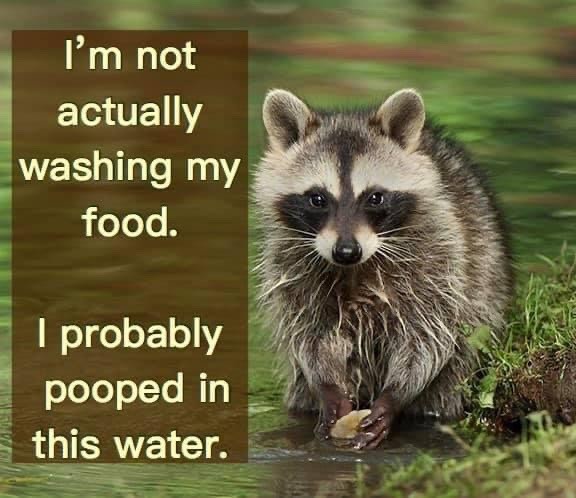Raccoons, often recognized by their masked faces and ringed tails, are known for a peculiar habit: they frequently dip their food in water before eating it. This behavior has led to the common belief that raccoons are meticulously “washing” their food to clean it. However, the reality is far more intriguing and less about hygiene than you might think. Raccoons aren’t actually washing their food to get rid of dirt or germs. In fact, they might even dip their food into water sources that are less than sanitary, sometimes even using the same water as a communal toilet! So, if they aren’t washing their food, what exactly are they doing?
 Raccoon dipping food in water
Raccoon dipping food in water
The Myth of Washing Food
The idea that raccoons are washing their food is a charming, albeit inaccurate, interpretation of their behavior. While it appears as though they are cleaning their food in the water, this is not the primary purpose. Raccoons are not particularly concerned with cleanliness in the way humans are, and their “washing” ritual has a much deeper, sensory-driven explanation.
Sensitive Paws: A Raccoon’s Superpower
To understand why raccoons dip their food in water, we need to appreciate their extraordinary sense of touch. Raccoons possess the most sensitive hands in the animal kingdom. Astonishingly, about two-thirds of a raccoon’s brainpower is dedicated to processing sensory information from their paws. Their small, dexterous hands are packed with nerve endings – over ten times more than what humans have in their hands!
Over time, these incredibly sensitive paws develop a protective layer, similar to a callus. Water softens this layer, enhancing their tactile perception. When a raccoon immerses its paws and food in water, it’s like unlocking a superpower. The water allows them to feel with incredible precision, exploring the texture, shape, and even temperature of the item in their grasp with heightened acuity.
Exploring Food, Not Cleaning It
So, when a raccoon dunks its food in water, it’s essentially engaging in a sophisticated form of tactile exploration. This “washing” behavior is primarily about gathering information about the food. By manipulating the food in water with their sensitive paws, raccoons are effectively “seeing” with their hands. They are memorizing the texture and characteristics of their meal, which helps them to identify it better and locate similar food sources in the future. This process is crucial for foraging and understanding their environment.
Wild vs. Captive Behavior
Interestingly, the frequency of this “washing” behavior can vary depending on whether a raccoon is in the wild or in captivity. Wild raccoons are observed dipping their food in water occasionally, especially when foraging near water sources for crayfish, snails, fish, and worms. However, it’s not a constant habit.
In contrast, captive raccoons, like those being cared for at wildlife rehabilitation centers, might exhibit this behavior less frequently with their food. Observations suggest that they might only dip their food in water about ten percent of the time. However, they often enjoy playing with other objects like toys and pebbles in water, indicating their continued fascination with tactile exploration in an aquatic environment.
Conclusion
In conclusion, the common perception of raccoons meticulously washing their food is a misconception. The real reason behind this fascinating behavior is their exceptional sense of touch. Raccoons dip their food in water to enhance their tactile perception, allowing them to explore and understand their food through touch. It’s a sensory investigation, not a sanitation process. This unique adaptation highlights the incredible sensory world of raccoons and their remarkable ability to perceive their environment through their highly sensitive paws.